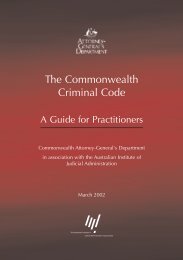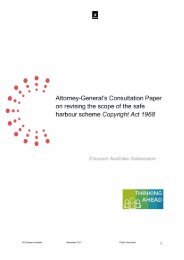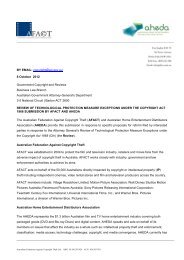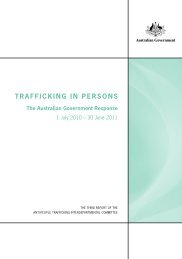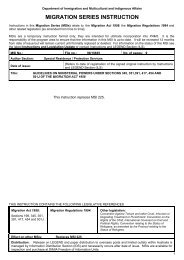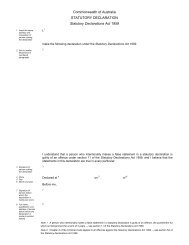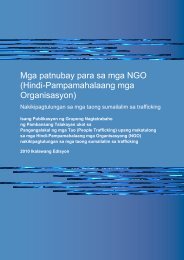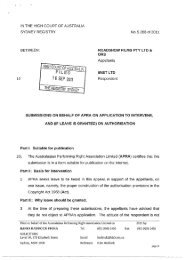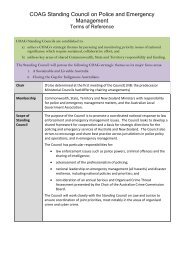Normann Witzleb [PDF 657KB] - Attorney-General's Department
Normann Witzleb [PDF 657KB] - Attorney-General's Department
Normann Witzleb [PDF 657KB] - Attorney-General's Department
Create successful ePaper yourself
Turn your PDF publications into a flip-book with our unique Google optimized e-Paper software.
33 Freedom of expression is regarded as a fundamental human right 45 but does likewise<br />
not enjoy absolute protection. Where freedom of speech and privacy collide in a<br />
particular case, achieving an optimal balance between both interests will often involve<br />
considerations of proportionality so that the limitation of each interest is justified, and<br />
goes no further than required by, the demands of the other. Adopting such a<br />
‘sophisticated balancing process’, 46 the courts would ask whether ‘in the circumstances,<br />
the degree of intrusion into the plaintiff’s privacy was proportionate to the public interest<br />
that the intrusion supposedly serves’. 47<br />
34 Unlike the European human rights jurisprudence that affects UK privacy law by virtue<br />
of the Human Rights Act 1998 (UK), 48 Australian law does not expressly adopt the<br />
concept of proportionality where private causes of action affect the parties’ human<br />
rights. 49 It would therefore be appropriate for any privacy bill to clarify the methodology<br />
of the balancing process, in particular the need for proportionality. It would then fall to<br />
the courts to adopt this framework and to refine the statutory methodology for balancing<br />
the competing interests through case law.<br />
7. Is the inclusion of ‘intentional’ or ‘reckless’ as fault elements for any<br />
proposed cause of action appropriate, or should it contain different<br />
requirements as to fault?<br />
The proposals<br />
35 The ALRC recommends that the cause of action should be restricted to ‘intentional’<br />
and ‘reckless’ acts on part of the defendant. 50 It defines an act as intentional if the<br />
defendant wilfully or deliberately invades the plaintiff’s privacy. In relation to<br />
recklessness, the ALRC report refers to the definition of recklessness in the<br />
Commonwealth Criminal Code, which distinguishes between recklessness ‘with respect<br />
to a circumstance’ and recklessness ‘with respect to a result’. 51 In both cases,<br />
recklessness requires an awareness of a substantial risk (that the circumstance exists,<br />
or will exist, or that the risk will occur, respectively) and further that it is unjustifiable to<br />
take that risk.<br />
45 For example, International Covenant of Civil and Political Rights, art. 19(2); European Convention on<br />
Human Rights, art. 10; Charter of Human Rights and Responsibilities Act 2006 (Vic), s 15, and Human<br />
Rights Act 2004 (ACT), s 16.<br />
46 NSWLRC Report, at [5.19].<br />
47 NSWLRC Report, at [5.16]; see also VLRC Report, at [7.21].<br />
48 Kassai v Hungary 5380/07 [2009] ECHR 1974; Mosley v UK 48009/09 [2011] ECHR 774; on the UK<br />
approach to proportionality in Convention cases, Campbell v MGN Ltd [2004] 2 AC 457; [2004] UKHL 22,<br />
at [20]-[22] (Lord Nicholls); R (on the application of Begum) v Denbigh High School [2005] 2 AC 246;<br />
[2006] UKHL 15.<br />
49 But see Charter of Human Rights and Responsibilities Act 2006 (Vic), s 7(2); considered in Momcilovic v<br />
The Queen [2011] HCA 34; generally, on proportionality and related concepts in Australian law, Rowe v<br />
Electoral Commissioner [2010] HCA 46, at [424-[466] (Kiefel J).<br />
50 ALRC Report, at [74.164].<br />
51 Section 5.4 (1) and (2) Criminal Code (Cth).<br />
12


![Normann Witzleb [PDF 657KB] - Attorney-General's Department](https://img.yumpu.com/26247895/12/500x640/normann-witzleb-pdf-657kb-attorney-generals-department.jpg)

